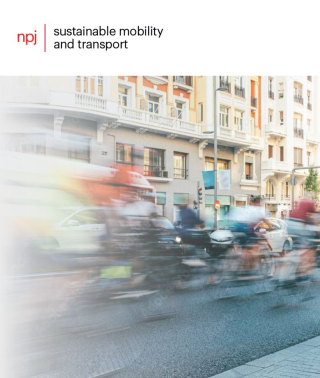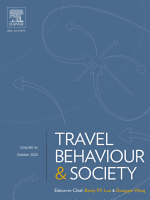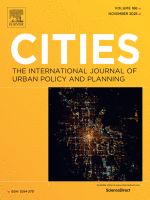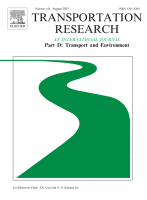-
3 Nov 2025 • Journal Article • Npj Sustainable Mobility and Transport
Mobilizing transport justice: a sufficientarian optimization framework for intermodal mobility systems
AbstractMost applied research on transport justice focuses on evaluating existing systems, while transport planning typically relies on utilitarian objectives such as minimizing average travel time, without accounting for fairness. This paper starts to bridge this gap by applying different principles of justice to the operational planning of transport systems. We use an intermodal
… show more -
17 Sep 2025 • Journal Article • Travel Behaviour and Society
Dignified transport: The case of paratransit
AbstractParatransit, often the sole public transport option in many cities in the Global South, typically suffers from low service levels, pollution, safety concerns, crashes, and a lack of respect for users. This study leverages the concept of dignity, which is not yet systematically explored in transport literature, to examine the experiences of paratransit actors. Dignity
… show more -
26 Aug 2025 • Journal Article • Cities
Proximity-centred accessibility – A conceptual debate involving planning practitioners worldwide
AbstractIn recent years, the concept of proximity has garnered increasing attention in both transportation research and practice, albeit under various terms and interpretations. Among these, the concept of the 15-minute city has catalysed attention in planning practice, with recent evolution to the x-minute city and city of proximities. In research, proximity-centred accessibility
… show more -
24 Jul 2025 • Journal Article • Travel Behaviour and Society
Urban roads: Enablers or barriers to walking? insights from Kigali, Rwanda
AbstractRoad designs in Sub-Saharan Africa (SSA) prioritize motorized traffic, despite the high proportion of pedestrians. This study examines the extent to which different road designs hinder or enable walking in Kigali, Rwanda, employing an exploratory and qualitative research approach. To carry out the study, two arterial roads were selected: one with a basic design and one
… show more -
1 Jul 2025 • Journal Article • Transportation Research Part D: Transport and Environment
Examining the links between public transport provision, suppressed travel and (in)sufficient accessibility
AbstractThis study engages a sufficientarian perspective to examine the role current basic levels of public transport provision play in delivering sufficient accessibility for inhabitants of sparsely populated areas. A survey was conducted among people living in areas which meet the criteria set out for basic levels of public transport provision for the Västra Götaland Region
… show more -
14 Jun 2025 • Journal Article • The Gerontologist
“I love public transport, but now I’m too afraid to use it”: A qualitative study of public transport use cessation among older adults Open Access
AbstractMobility is a hallmark of functional ageing and a major health determinant in older adults. Mobility is known to decline with age, yet, except for research on driving cessation, little is known about the role of giving up other transport modes in this decline. This exploratory qualitative research focusses on public transport use, and aims to describe the process of
… show more -
6 Jun 2025 • Journal Article • Transportation Research Procedia
Transport Justice in Sub-Saharan Africa Challenges, tools, perspectives
AbstractPrevailing methods of transport planning focus on the functioning of transport systems rather than on the services people receive from those systems. In line with this perspective, and as epitomized by the four-step model, road congestion has been seen as the main transport problem, and investments to ease congestion are given priority. This approach, still very dominant
… show more -
17 Apr 2025 • Journal Article • Transportation
Determining people’s ease and difficulty of movement based on observed travel behavior
AbstractThis paper presents an approach to use GPS-based travel behavior surveys to determine who is being served well and who is being served poorly by the transport system. We draw on the extensive literature on travel behavior, which has shown that people’s travel behavior is at least in part shaped by the travel barriers they experience. Starting from this basic insight
… show more -
11 Jan 2025 • Journal Article • African Transport Studies
Urban roads and walking: Exploring pedestrian perceptions and experiences in a Sub-Saharan African City
AbstractAmidst rapid urbanization and increasing motorization, walking remains a widely used mode of transport in Sub-Saharan Africa (SSA). The frequency with which people walk, the distance for which they may be willing to walk, and the convenience and safety with which they can walk, depend significantly on road design. Moreover, the impact of roads on walking behavior will
… show more -
Nov 2024 • Journal Article • Journal of Transport & Health
Examining the health effects of public transport use on older adults: A systematic review
AbstractBackground and aim Public transport use has been linked to several health benefits in the general population and is crucial for older adults’ mobility, due to an age-related decline in physical and cognitive capacity and mobility, particularly the ability to use other modes of transport. The objective of this systematic review is to determine what is known about the
… show more
































